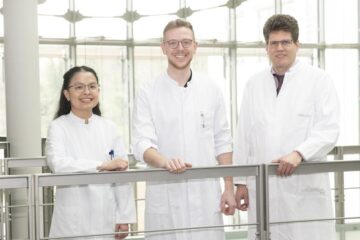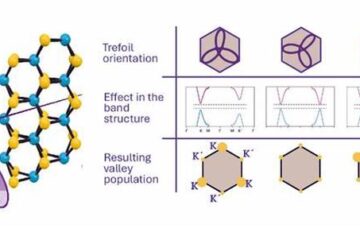Bristol scientists find key to unlock body’s own cancer defence

Scientists at Bristol University have found that a protein present in normal body tissues can prevent tumour growth.
A team led by Dr Dave Bates, British Heart Foundation Lecturer, and Dr Steve Harper, Senior Research Fellow in the Microvascular Research Laboratories, in the Department of Physiology at Bristol University, have discovered that a type of vascular endothelial growth factor (VEGF) found in normal tissue, including blood, can prevent cancers from growing. The research findings will be published in the world’s most prestigious scientific cancer journal, ’Cancer Research’, next week [1 November 2004].
The growth of any cancer depends on its ability to maintain a blood supply that will deliver nutrients. For a cancer to grow from the size of a pinhead to that of a golf-ball, the blood supply of the tumour has to grow with the expansion of the tumour itself. Most forms of VEGF help this blood vessel growth. The new form of VEGF, VEGF165b, which was discovered by the same team in 2002, inhibits the growth of new blood vessels required for tumours to grow above one millimetre.
They have also found that this form of VEGF is generally found in many normal parts of the body, including the prostate, but not in prostate cancer, and have established how this form of VEGF works on blood vessels.
The identification of how this new form of VEGF works, and its effects on tumours, means that it could be possible to prevent tumour growth by starving the tumour using the body’s own anti-cancer agent, VEGF165b. The advantage of using VEGF165b over established compounds to treat cancer is that VEGF165b is a natural protein produced by the body under normal circumstances. Many new cancer therapies are based on starving the tumour of nutrients by attacking the tumour blood supply rather than the cancer cells. Blocking VEGF using antibodies has recently been shown to be effective in large-scale trials in colorectal cancer in the United States.
New blood vessel growth is also necessary for many normal body functions. These include the development of the embryo and, in adults, wound healing, the development of the placenta in pregnancy and of muscles during physical training programmes. However, it is thought that adults can live healthily without blood vessel growth for extended periods of time. This blood vessel growth is controlled by many factors, but VEGF is the most powerful factor.
Dr Bates, said: “Now that we have found out that this protein works in living tissues, we need to find the best way of using it in cancer, with tumour models. We also need to try it in models of other diseases where blood vessel growth is necessary, such as diabetes, age related macular degeneration and arthritis.”
Dr Harper, added: “After two years of hard work it is a big step to show that this protein works in real cancers. We hope to be able to take this forward in the next few years to work out how to treat patients with cancer, eye disease and other conditions where this protein is important.”
Media Contact
More Information:
http://www.bristol.ac.ukAll latest news from the category: Life Sciences and Chemistry
Articles and reports from the Life Sciences and chemistry area deal with applied and basic research into modern biology, chemistry and human medicine.
Valuable information can be found on a range of life sciences fields including bacteriology, biochemistry, bionics, bioinformatics, biophysics, biotechnology, genetics, geobotany, human biology, marine biology, microbiology, molecular biology, cellular biology, zoology, bioinorganic chemistry, microchemistry and environmental chemistry.
Newest articles

Simplified diagnosis of rare eye diseases
Uveitis experts provide an overview of an underestimated imaging technique. Uveitis is a rare inflammatory eye disease. Posterior and panuveitis in particular are associated with a poor prognosis and a…

Targeted use of enfortumab vedotin for the treatment of advanced urothelial carcinoma
New study identifies NECTIN4 amplification as a promising biomarker – Under the leadership of PD Dr. Niklas Klümper, Assistant Physician at the Department of Urology at the University Hospital Bonn…

A novel universal light-based technique
…to control valley polarization in bulk materials. An international team of researchers reports in Nature a new method that achieves valley polarization in centrosymmetric bulk materials in a non-material-specific way…





















